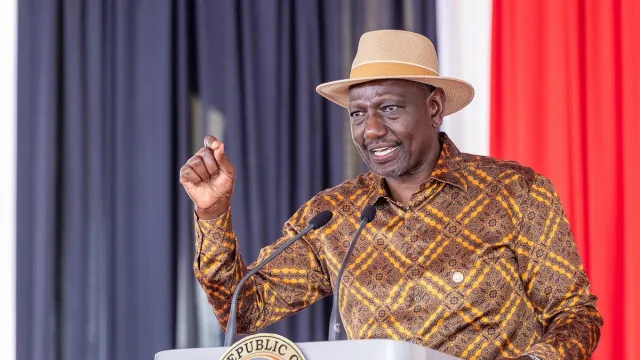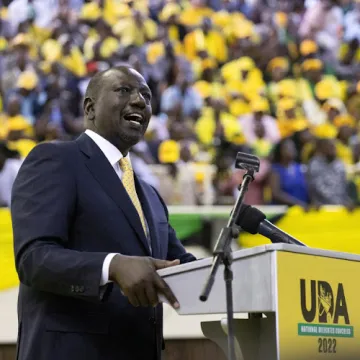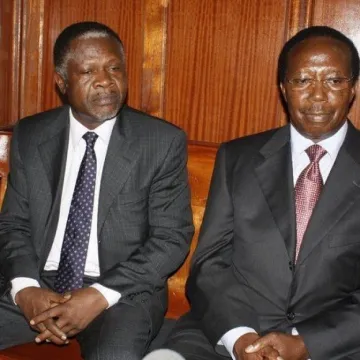Ruto’s anti-corruption gamble: Can a multiagency unit deliver?

President William Ruto.
In yet another attempt at slaying the dragon of corruption in Kenya, President William Ruto has established a multi-agency team charged with tackling mounting cases of economic crime and spearheading recovery of assets associated with graft deals.
The new team, which shall be led by officers from the executive office of the president, draws membership from other units including the Ethics and Anti-Corruption Commission (EACC), and the Directorate of Criminal Investigations (DCI).
Its membership also includes representatives from the Office of the Director of Public Prosecution (ODPP), the National Intelligence Service (NIS), the Kenya Revenue Authority (KRA), the Central Bank (CBK), and the Assets Recovery Authority (ARA) among others.
Under State House leadership and a secretariat in the Office of the Attorney-General, the multiagency team has been tasked with recovering stolen billions while crushing established graft cartels in the country.
Corrupt lawmakers
The initiative was established on Monday, August 18th, 2025, when the President fingered members of the National Assembly for runaway corruption with allegations that a governor offered up to KES150 million to escape the wrath of lawmakers during impeachment proceedings.
“Where does somebody find KES150 million? Is that his money? That is money that belongs to the county,” asked the President during a joint parliamentary group meeting in Karen, Nairobi, that brought together both ODM and UDA lawmakers.
"There are legitimate concerns about how resources are being spent at the counties, and we cannot run away. By virtue of the position I hold today, I am a consumer of raw intelligence. I know what's going on,” he said.
“Do you, for example, know that a few members of your committee collected KES10 million shillings so that you don’t pass that law on anti-money laundering? Did you get the money?” he asked.
IMF on graft in Kenya
In early July, a team from the International Monetary Fund announced the conclusion of a "governance diagnostic" mission which aimed at identifying avenues of persistent corruption with a view to recommend relevant reforms.
"They engaged with the government and non-governmental stakeholders to examine governance weaknesses and corruption vulnerabilities across core state functions as provided by the IMF’s 2018 framework for Enhanced Engagement on Governance," the IMF stated in an update.
IMF said its team of experts sought views from the country's anti-corruption and oversight institutions where they discussed about the effectiveness of current legal and institutional frameworks in fighting corruption. The mission also met members of Kenya’s National Assembly.
Additionally, the mission engaged with representatives from civil society, the private sector, business associations who have been raising concerns about runaway corruption in the country.
Also engaged during this mission were international development partners to gather perspectives on governance challenges and anti-corruption efforts.
Proceeds of corruption
While the latest directive places the leadership of the team at the Office of the President, critics question whether it will be impartial given the mounting allegations of graft in Kenya's top office.
According to former Deputy President Rigathi Gachagua, the ongoing empowerment forums in Kenya led by representatives in the Office of the President are nothing by a spirited push to influence Kenyans to re-elect Dr. Ruto in 2027.
"These are the proceeds of corruption. These funds are being used to corrupt the morals of our people and try to bribe voters ahead of the 2027 General Election. It is all deceit; it's all a conman's game, and it has nothing to do with empowerment. It is simply bribery and a scheme to deceive the Kenyan people into having William Ruto reelected as the president," the former DP said, questioning the source of funds.
Most corrupt government units
Early this month, the EACC released a new study listing the police, and officers at the KRA as some of the most corrupt and unethical professionals in the country.
In the survey, county revenue workers, land surveyors, architects, doctors and nurses, bankers, accountants, engineers, teachers, lecturers and journalists also ranked high in the dirty list of most corrupt professionals in Kenya.
Last year, on account of U.S.-based non-state unit, Organized Crime and Corruption Reporting Project (OCCRP)'s Person of the Year nominations, where over 40,000 votes were received globally amid graft allegations, economic failures, and violent protest crackdowns, Dr. Ruto was ranked as Kenya's most corrupt politician.
At the moment, Transparency International's CPI ranks Kenya 121 out of 180 countries with a score of 32/100 on corruption.





